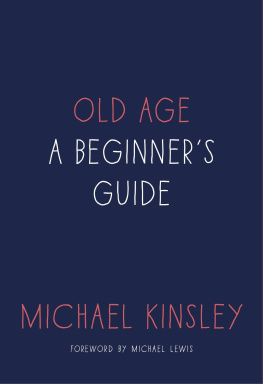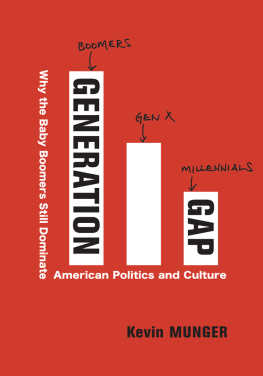Copyright 2016 by Michael Kinsley
Foreword copyright 2016 by Michael Lewis
All rights reserved.
Published in the United States by Tim Duggan Books, an imprint of the Crown Publishing Group, a division of Random House LLC, a Penguin Random House Company, New York.
www.crownpublishing.com
Chapters in this book have previously appeared, in different forms, as: In Defense of Denial (Time, December 9, 2001), Yes, It Really Is Brain Surgery (Time, July 16, 2006), Mine Is Longer Than Yours (The New Yorker, April 7, 2008), The Least We Can Do (The Atlantic, October 2010), and Have You Lost Your Mind? (The New Yorker, April 28, 2014).
CROWN and the Crown colophon are registered trademarks of Penguin Random House LLC.
Library of Congress Cataloging-in-Publication Data
Names: Kinsley, Michael E., author.
Title: Old age: a beginners guide / Michael Kinsley.
Description: First edition. | New York : Tim Duggan Books, 2016.
Identifiers: LCCN 2015038958| ISBN 9781101903766 (hardback) | ISBN 9781101903773 (ebook)
Subjects: LCSH: AgingUnited States. | Life change eventsPsychological aspects. | Baby boom generationUnited States. | Life. | Values. | Meaning (Psychology) | Kinsley, Michael E. | Authors, AmericanBiography. | Parkinsons diseasePatientsUnited StatesBiography. | BISAC: LITERARY COLLECTIONS / Essays. | HEALTH & FITNESS / Diseases | AUTOBIOGRAPHY / Personal Memoirs.
Classification: LCC PS3611.I655 2016 | DDC 814/.54dc23 LC record available at http://lccn.loc.gov/2015038958
ISBN9781101903766
eBook ISBN9781101903773
Cover design by Christopher Brand
v4.1
ep
Contents


There arent a lot of living writers Im dying to read on their own mortality. Its not that the subject lacks importance, or that there arent lots of great living writers. Its just that its hard to imagine even the best of them making their descent swing on the page. How much left to say can there be? Plus, you know how the story is going to end. Michael Kinsleys an exception. If its Kinsley on the subject of his horrible decline, and inevitable demise, Im a buyer. Im pretty sure that Id think that even if I didnt know him, or if he hadnt more or less given me my start in journalism, or let me in on his secret, twenty-five years ago, when he was first diagnosed with Parkinsons disease. Id like to use the few paragraphs I have here to explain why. That is, to explain why, if youd said to me Mike Kinsleys just written a book using his Parkinsons disease as a window onto age and death, my mind would have skipped a happy little skip and Id have said, Ill bet its funny and great and a perfect birthday gift.
The first is that Kinsley on any subject is an exception. Hes always thought things no one else has thought, and noticed things that other people do not. To take a small example, he was the first to notice when Al Gore, a new, seemingly vital but self-serious thirty-eight-year-old United States senator, was an old persons idea of a young person. He was the first to notice that when political pundits said that some politician had committed a gaffe what they actually meant was far more interesting. A gaffe is when a politician tells the truth, he wrote, a line now known as Kinsleys Law. (Margaret Thatcher cited Kinsleys Law in her memoirs, seriously.) Twenty-five years of Parkinsons disease has had no discernible effect on Kinsleys X-ray vision. When he hears that billionaire Larry Ellison has spent almost five hundred million dollars on research that might render him immortal, and then sees Ellison quoted in the newspaper saying Death has never made any sense to me, Kinsley doesnt nod his head like everyone else at the seeming importance of the billionaires thought, and move on. He sees through to the absurd self-importance and writes, The question is not whether death makes sense to Larry Ellison but whether Larry Ellison makes sense to death.
Thats another reason Kinsley is better suited than anyone I can think of to face, at least on the page, his own death: his lack of self-importance. His awareness of his place in the universe makes the idea that he will one day have no place in it at all far more enjoyable, at least for the reader. Incredibly, he doesnt seem to be faking it: He seems genuinely to have worked out his own proportions in relation to the world around him. At the same time, hes wildly ambitious. Its an odd combination but, for literary purposes, incredibly effective. He basically wants to win at death, by writing a better book about it than anyone else, but doesnt rate at all highly the importance of his own deathwhich of course just makes it all the more likely to triumph over other peoples.
Still, there is something here thats not quite right about this book. I got so much pleasure from it that it took me a while to put my finger on what bothered me about it. Then I realized: I cant imagine Michael Kinsley dead. I cant even imagine him with Parkinsons disease even though Ive known hes had it since the early years of the first Clinton administration. Hes too full of life. Too full of surprise. Hes a kind of reverse Al Gore: not an old person pretending to be a young person, but a young person pretending to be an old person. I dont know that Michael Kinsley is incapable of death, or even of aging. But his book did make me wonder. As it will you.
Michael Lewis


This is not a book about Parkinsons disease. At least its not intended to be a book about Parkinsons disease. Its supposed to be a book about the baby boom generationthose born between 1946 and 1964as they enter lifes last chapter. As a reasonably competitive boomer myself, I realized that the second thought of every boomer writer and journalist in the country, after getting the news of a serious or terminal illness, is going to be, I wonder if theres a book in this? Books about the experience of growing old, of getting cancer, of falling off your bike. I realized that besides the tsunami of dementia heading our way, there is going to be a tsunami of books about health issues by every boomer journalist who has any, which ultimately will be all of them. There is a lot in here about Parkinsons, because it will dominate my own experience of lifes last chapter, so of course Ive been giving it plenty of thought since I was diagnosed in 1993, twenty-three years ago. And you are encouraged to buy the book for any reason, including the mistaken impression that it is all about Parkinsons. The book is supposed to be funny, as well, on a subject that does not lend itself to humor. It only has a couple of outright jokes in its repertoire, neither about Parkinsons disease per se.
Here, for the record, is the only joke I know about Parkinsons. I heard it from my friend Margo Howard, who told it to me long before she knew I had the disease: Well, it seems that old Mrs. Goldberg and Mr. Murphy were in the same nursing home, and every evening they would watch TV together while she held his member. Then one day Mr. Murphy announced that he was transferring his affections to old Mrs. Meyers. Why? She has Parkinsons disease.










